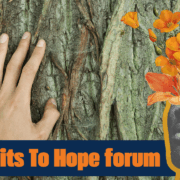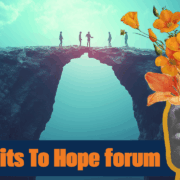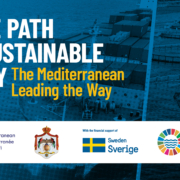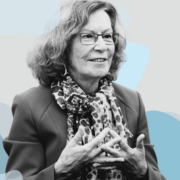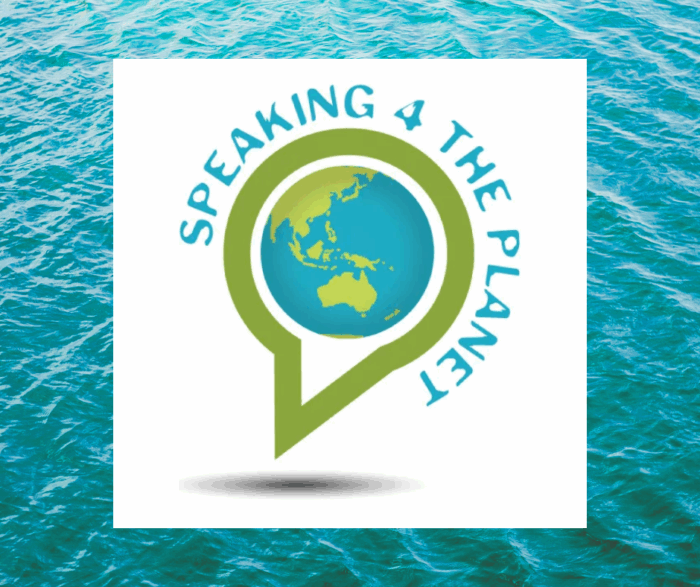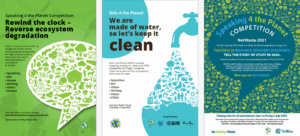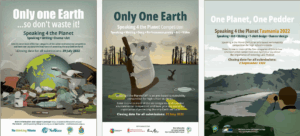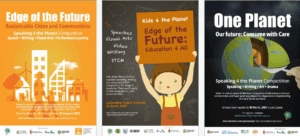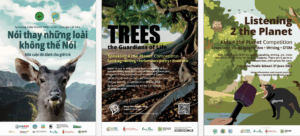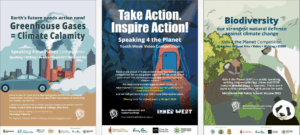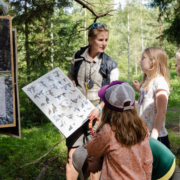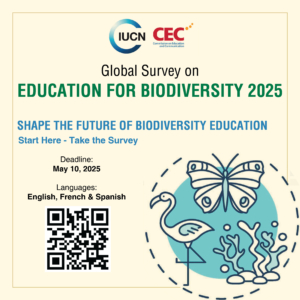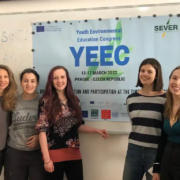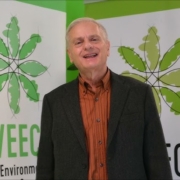This article presents the perspective of María Novo – Doctor of Philosophy and Educational Sciences, Professor Emeritus at the Spanish National University of Distance Education (UNED), as well as a writer, poet, and painter – on the theme of integrated ecology and the relationship between humans and nature.
The interview was conducted after the 7th International Congress on Environmental Education, held in Madrid, and in continuity with the themes addressed during the National Conference of the Weec Italy Network on the island of Ischia. Through her experience, Novo illustrates how scientific knowledge and artistic expression can converge in environmental education, offering a more holistic and humanistic approach to sustainability.
Introduction
In recent decades, the urgency of the environmental crisis has pushed educators, researchers, and institutions to rethink the very foundations of how we approach the relationship between humans and nature. The concepts of integrated ecology and sustainability are no longer limited to scientific discourse but now embrace philosophical, artistic, and emotional dimensions as well.
Within this broader vision, the 7th International Congress on Environmental Education—held last March in Madrid and organized by the Spanish Association for Environmental Education—served as an important platform for reflection and dialogue. In continuity with the themes addressed at the National Conference of the Weec Italy Network on the island of Ischia, we interviewed María Novo, a leading figure in environmental education in Spain and internationally.
A scholar with a solid academic background and a deep sensitivity as a poet and painter, Dr. Novo has long explored the intersection between rational knowledge and creative expression. In this conversation, she shares her personal and professional journey, emphasizing the value of integrating science and art in educational processes. Her approach is a testament to the power of a holistic vision—one that not only informs but also inspires, involving both mind and heart in the quest for a sustainable future.
Con motivo de su conferencia en la inauguración del VII Congreso Internacional de Educación Ambiental organizado por la Asociación Española de Educación Ambiental, entrevistamos a María Novo, Doctora en Filosofía y Ciencias de la Educación, Catedrática Emérita de la Universidad Nacional de Educación a Distancia de España y, last but not least, escritora, poeta y pintora.
La Dra. Novo nos comenta su larga experiencia trabajando en proyectos que aúnan el enfoque científico y la mirada artística, un planteamiento que ha incluido en su conferencia. Y recurre a su historia personal para contarnos cómo vivió la necesidad de conciliar su trabajo en la universidad y su vocación de poeta y pintora.
-No me quedaba más remedio que poner de acuerdo ambos aspectos de mi vida por pura coherencia. Así que comencé a pintar y escribir poemas sobre principios científicos y pude comprender y mostrar que Ciencia y Arte no solo no son contrarios sino que son totalmente complementarios y se enriquecen recíprocamente.
-Para transitar en esta dirección, en el año 2000 inicié con otros profesionales el Proyecto EcoArte (www.ecoarte.org). En el año siguiente lo presentamos internacionalmente en la UNESCO con una exposición de pintura sobre cuestiones de la ciencia. Después vinieron otras exposiciones, conferencias, aportaciones… Eso es lo que me ha llevado a incorporar el valor del arte como instrumento de cambio en mi conferencia.
Qué temas abordaste en esta tu conferencia inaugural del Congreso titulada “Es sostenible la sociedad de las prisas? La educación como palanca de cambio.
-Comencé planteando el difícil escenario que presenta el momento presente: hemos roto algunos mecanismos de regulación de la naturaleza y hemos desbordado sus límites. El resultado es un mundo incierto y peligroso, incentivado por los conflictos bélicos, políticos y sociales, también por la enorme desigualdad en el acceso y uso de los recursos…
-En mi opinión, en todos estos procesos se da una constante que se repite insistentemente: la aceleración, los ritmos precipitados con los que hemos explotado los bienes naturales a la hora de producir y consumir.
-Por eso me atrevo a llamar a esta sociedad “la sociedad de las prisas”. Ese es el título de mi último libro, en el que analizo con detalle cómo esta sociedad es también la de la insostenibilidad ecológica, social, personal…
¿Cuáles serían, a tu juicio, los rasgos básicos de esta sociedad?
En mi conferencia he señalado tres: Complejidad, Riesgo e Incertidumbre.
La complejidad porque el sistema ecológico no funciona mediante relaciones causa efecto lineales, sino mediante realimentaciones, sinergias, efectos de umbral… Eso hace impredecibles los resultados de algunos procesos.
En consecuencia, los modelos mecanicistas, deterministas y reduccionistas propios de la Modernidad no nos sirven para abordar los problemas ecológicos y sociales del mundo actual. Lo que hace necesario que trabajemos siempre en educación ambiental a partir de un enfoque sistémico/complejo.
Por lo que respecta al riesgo, es preciso enfatizar que ir más allá de los límites con nuestros impactos sobre la naturaleza genera riesgos desconocidos. Y que el “precio” de estos riesgos no es solo económico, sino que afecta a la vida misma: vida natural, recursos físicos y vidas humanas (catástrofes socioecológicas, migraciones, hambrunas…).
Estas dos dimensiones de la crisis ambiental explican el por qué estamos actualmente en contextos de alta incertidumbre. Hemos sobrepasado varios puntos de no retorno (tipping points). En lo que va de siglo XXI hemos consumido tantos recursos naturales y hemos lanzado tanta contaminación y calor a la atmósfera como en todo el siglo XX.
Y este viaje sin freno hacia un deterioro creciente de nuestras condiciones de vida nos coloca al borde del abismo. Estamos en la sociedad de las prisas y la aceleración.
Dado tu conocimiento en la materia, me gustaría conocer tu opinión sobre el papel de la educación ambiental en la sociedad que describes.
Se habla mucho, en exceso, de un cambio de paradigma. Pero es preciso profundizar en el concepto y lo que significa: En ciencia, cuando cambia un paradigma lo que cambia no son las respuestas sino las preguntas.
Necesitamos hacernos preguntas no solo distintas sino de otra índole. Junto a las preguntas económicas (que son las que rigen nuestras sociedades) es preciso manejar interrogantes socioecológicos:
¿Seremos capaces de acoplar nuestros ritmos acelerados a los de le naturaleza?
¿Sabremos adaptarnos a los nuevos escenarios y mitigar los daños?
¿Aprenderemos a valorar el tiempo, los ritmos, las pautas de producción y consumo en un escenario de recursos no renovables escasos?
¿Estamos dispuestos a aplicar la cuestión de los límites a nuestra vida personal: poner límites a nuestros deseos, aprender a desear…?
Hemos llenado el mundo de paneles solares, aerogeneradores, centrales nucleares… Todo eso son respuestas al viejo modelo del crecimiento indefinido, un modelo que nos lleva a la catástrofe. Pero la mayoría de los gestores económicos y políticos no explican a la ciudadanía que lo que hay que cambiar son nuestras formas de vida. Ese es un cambio en las preguntas… que debe conducirnos a comprender ya no podemos seguir con las pautas de explotación de recursos y producción de desechos en forma de contaminación, calor, desorden…
Y no pienso en los niños, esto es demasiado complejo para ellos. En las primeras etapas de la vida basta con que aprendan a amar la naturaleza, a entender cómo funciona y a moderar su consumo. Me refiero a la educación ambiental que se imparte en las universidades, en los Masters, en los Seminarios y Grupos de Trabajo, en los Congresos destinados a los adultos que, antes o después, tomarán decisiones sobre los recursos. Ahí es donde podemos incidir con toda la crudeza del tema.
¿Cuáles serían, en tu opinión, las estrategias más efectivas para promover otros comportamientos socioecológicos?
Me remito al principio para responderte: esa mezcla de complejidad y riesgos nos sitúa ante un escenario inédito de alta incertidumbre. Como afirmaba Prigogine, el futuro no está dado, vivimos el fin de las certidumbres.
Si nos situamos ahí, la pregunta es ¿Seremos capaces de enseñar a los estudiantes a gestionar la incertidumbre? ¿Sabremos hacerlo los educadores ambientales?
Y aparecen, de inmediato, otras preguntas: ¿Cuándo desapareció de la educación la incertidumbre? ¿O es que nunca estuvo presente de forma generalizada en ella? ¿Podemos esperar que las generaciones jóvenes sepan lidiar con el mundo incierto e inseguro que les espera?
En educación ambiental es muy importante, en el campo de las Ciencias Sociales, plantear distintas alternativas, una gama de grises, que acostumbre a los estudiantes a manejar una lógica borrosa y a elaborar alternativas a los problemas. Estamos metidos en una espiral de información y tecnificación de nuestros niños y jóvenes. Les enseñamos miles de conceptos, teorías, destrezas informáticas…, pero no superamos la división aristotélica de verdadero/falso y nos perdemos los matices del mundo real.
Tenemos que mostrar que para cualquier problema existen no una, sino múltiples soluciones. Y aquí juegan un papel importante el arte y la creatividad que contribuyen a generar preguntas con múltiples repuestas…
El arte nos sitúa en un punto de observación abierto, es un estímulo para la imaginación, nos impulsa a ver lo que todos ven y pensar lo que nadie ha pensado. Una visión artística, creativa, es capaz de dar entrada a lo impredecible, de captar y expresar relaciones y posibilidades a las que no se llega solo por la vía racional.
Utilizar el arte en educación ambiental favorece también la puesta en práctica de procesos lentos, de situaciones de silencio y reflexión, de asombro, que acostumbren a las personas que aprenden a los debates sosegados, a la escucha…
Y finalmente, junto con el arte está el problema del tiempo. Los educadores ambientales podemos dar ejemplo en el necesario ejercicio de aminorar la velocidad de los procesos destructivos y el consumo. La sociedad de las prisas es la que, con la aceleración de los impactos sobre la naturaleza, nos ha traído a la crisis ecológica y social.
En mi opinión, el reto es pensar desde la complejidad y vivir (producir y consumir) desde la sencillez. Una vida personal y profesional responsable, consciente de los límites y condicionamientos del planeta, es el mejor aprendizaje que podemos practicar los docentes y proponer a nuestros estudiantes. En esa dirección, surge una pregunta que debería estar en el frontispicio de nuestros colegios y universidades:
¿Cuánto es suficiente?

